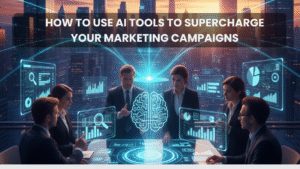Digital marketing has become an essential part of modern business strategies. It helps brands connect with their audience, increase visibility, and drive sales. As technology continues to grow, so does digital marketing. New trends, tools, and strategies emerge every year, making it crucial for businesses to stay updated.
In 2025, digital marketing will be more data-driven, customer-centric, and technology-powered than ever before. To stay ahead of the competition, businesses must understand and adapt to these changes. This guide will explore key digital marketing trends, their importance, and how businesses can benefit from them.
What is Digital Marketing?
Digital marketing refers to promoting products and services through online channels such as websites, social media, email, and search engines. It includes strategies like content marketing, search engine optimization (SEO), pay-per-click (PPC) advertising, and social media marketing.
Unlike traditional marketing, which relies on print ads, TV commercials, and billboards, digital marketing allows businesses to reach a wider audience online. It is more cost-effective and provides better tracking and analytics, making it easier to measure success and make data-driven decisions.
Key Components of Digital Marketing
Search Engine Optimization (SEO) – Optimizing content to rank higher on search engines.
Content Marketing – Creating valuable content to attract and engage customers.
Social Media Marketing – Promoting brands through platforms like Facebook, Instagram, and LinkedIn.
Email Marketing – Sending targeted messages to engage and retain customers.
Pay-Per-Click Advertising (PPC) – Running paid ads on search engines and social media.
Affiliate Marketing – Partnering with influencers and other websites to promote products.
Video Marketing – Using videos to increase brand awareness and engagement.
Benefits of Digital Marketing
Businesses of all sizes can benefit from digital marketing. Here are some key advantages:
1. Cost-Effective and Measurable Results
Traditional marketing methods like TV and newspaper ads can be expensive, and measuring their impact is hard. Digital marketing, on the other hand, allows businesses to track performance in real-time. With tools like Google Analytics and Facebook Insights, companies can see how their campaigns perform and adjust for better results.
2. Wider Audience Reach and Better Targeting
With digital marketing, businesses can reach a global audience. Unlike traditional marketing, which is limited to specific locations, online campaigns can target people worldwide. Plus, digital marketing allows precise targeting based on age, location, interests, and behaviour, ensuring businesses connect with the right audience.
3. Improved Customer Engagement
Social media, email, and live chat enable businesses to interact with their customers in real-time. This improves engagement, builds trust, and strengthens customer relationships. Companies can also use digital marketing to provide personalized experiences, such as sending special offers based on user preferences.
Importance of Digital Marketing
Digital marketing is not just an option but necessary for businesses looking to grow in the digital age. Here’s why:
1. Important for Business Growth in the Digital Era
More people are shopping and searching for services online. Without a strong digital presence, businesses risk losing customers to competitors who have effective online marketing strategies.
2. Helps Brands Stay Competitive
Almost every business, from small startups to large corporations, invests in digital marketing. Companies that fail to adopt digital strategies may struggle to compete. A strong digital marketing plan ensures businesses remain visible and relevant.
3. Builds Brand Awareness and Trust
Customers trust brands they see and interact with online. Digital marketing allows businesses to showcase their expertise, share customer testimonials, and create engaging content. This builds credibility and helps attract and retain customers.
Choosing the Right Digital Marketing Agency
Not every business has the expertise or time to manage digital marketing independently. That’s where digital marketing agencies come in. Choosing the right Digital Marketing Agency can make a huge difference in achieving business goals. Here’s what to consider when selecting an agency:
1. Key Factors to Consider
When choosing a digital marketing agency, keep these factors in mind:
- Experience – Look for agencies with a proven track record and expertise in your industry.
- Services Offered – Ensure they provide the digital marketing services you need, such as SEO, social media marketing, or PPC advertising.
- Client Reviews and Testimonials – Check their reputation by reading reviews and case studies.
- Communication and Transparency – A good agency should provide clear reporting and inform you about your campaigns.
2. Understanding Business Goals Before Selecting an Agency
Before hiring an agency, define your business goals. Are you looking to increase website traffic, generate leads, or boost sales? Knowing your objectives helps you find an agency that aligns with your needs.
3. Importance of Transparency and Measurable Results
A reliable digital marketing agency should be transparent about its strategies and provide measurable results. Ask about their reporting methods and how they track performance. Agencies that offer data-driven insights help businesses make informed decisions and improve their marketing efforts.
Artificial Intelligence (AI) in Marketing
Marketing is constantly evolving, and one of the biggest drivers of change today is artificial intelligence (AI). AI transforms how businesses interact with customers, making marketing strategies more effective and personalized. Companies use AI to enhance customer experiences and improve efficiency, from AI-powered chatbots to personalized recommendations.
AI-Powered Chatbots and Customer Service
AI-powered chatbots have become an essential tool for businesses. These chatbots provide instant responses, helping customers get answers to their questions without waiting for a human representative. They are available 24/7, reducing response time and improving customer satisfaction. Companies like Amazon and Facebook use AI chatbots to assist customers, resolve issues, and complete transactions.
Beyond chatbots, AI helps businesses analyze customer behaviour and predict their needs. For example, AI can track a customer’s past purchases and browsing habits to offer personalized product suggestions. This creates a seamless shopping experience and increases the chances of making a sale.
Personalized Content and Recommendations
Consumers today expect a personalized experience. AI makes this possible by analyzing large amounts of data to understand customer preferences. Platforms like Netflix, Spotify, and Amazon use AI algorithms to suggest movies, songs, and products based on user behaviour.
AI-driven personalization extends to email marketing, social media, and website content. Businesses use AI to send personalized emails, recommend blog articles, and display customized ads. This approach not only keeps customers engaged but also boosts conversions.
Transform Your Digital Presence
Get personalized strategies and solutions tailored to your business needs.
- Free Initial Consultation
- Custom Solution Planning
- Expert Team Support
Voice and Visual Search Growth
With the rise of smart devices, more people are using voice and visual search. AI plays a crucial role in optimizing these search methods.
Rise of Voice Assistants (Alexa, Google Assistant)
Voice assistants like Alexa, Google Assistant, and Siri are changing how people search for information. Instead of typing a query, users simply speak to their devices. This means businesses must optimize their content for voice search by using natural language and answering common questions directly.
For example, instead of targeting the keyword “best coffee shop in New York,” businesses should focus on conversational queries like “Where can I find the best coffee near me?” This shift requires a new SEO strategy tailored for voice search.
Importance of Image and Video Search Optimization
AI is also improving visual search capabilities. Google Lens and Pinterest Lens allow users to search for products by uploading images. This means businesses must optimize their images with proper descriptions, alt text, and high-quality visuals.
Retailers like IKEA and ASOS have implemented AI-powered visual search features to help customers find products easily. If a shopper sees a dress they like, they can upload an image, and AI will find similar products. This enhances the shopping experience and increases sales.
Short-Form Video Content
Short-form videos have taken over social media platforms. TikTok, Instagram Reels, and YouTube Shorts have become popular ways for brands to engage with audiences quickly and effectively.
Popularity of TikTok, Instagram Reels, and YouTube Shorts
Short videos grab attention instantly, making them perfect for marketing. Brands use these platforms to showcase products, share behind-the-scenes content, and engage with customers through trends and challenges. Since these videos are quick and entertaining, they encourage higher engagement.
Engaging Storytelling Through Short Videos
To stand out, businesses must focus on storytelling. Instead of just promoting products, brands should create engaging, relatable, and authentic content. Whether it’s a funny skit, a quick tutorial, or an emotional story, short videos help brands connect with their audience on a more in-depth level.
Influencer and Micro-Influencer Marketing
Influencer marketing is evolving. While big influencers still have a role, brands are now focusing more on micro-influencers—those with smaller but highly engaged audiences.
More Focus on Niche Influencers
Micro-influencers specialize in specific niches: fitness, fashion, tech, or travel. Their followers trust them more because they seem relatable and genuine. Brands collaborate with these influencers to promote products authentically.
Authenticity and Trust Over Follower Count
Consumers value authenticity over large follower numbers. A recommendation from a trusted micro-influencer can be more effective than a celebrity endorsement. Businesses should prioritize influencers who align with their brand values and strongly engage with their audience.
Privacy and Data Protection
With stricter data privacy laws, businesses must be more transparent about collecting and using customer data.
Stricter Data Privacy Laws
Regulations like the GDPR and CCPA require companies to protect user data and get explicit consent before collecting information. This means marketers must find new ways to gather insights while respecting privacy.
Importance of First-Party Data Collection
To adapt, businesses are shifting towards first-party data collection. Instead of relying on third-party cookies, companies encourage users to share data willingly through newsletters, surveys, and loyalty programs. This builds trust and ensures compliance with privacy regulations.
Social Commerce and Shoppable Content
Social media platforms are becoming shopping destinations. With the rise of social commerce, customers can now buy products directly from apps like Instagram, Facebook, and TikTok.
Growth of In-App Shopping on Social Media
Brands leverage social media to drive sales through shoppable posts and live shopping events. Consumers can browse and purchase products without leaving the app, making shopping more convenient.
Seamless Buying Experience for Customers
By integrating shopping features into social media, businesses make purchasing seamless. Users no longer need to visit multiple websites to buy a product; they can complete transactions instantly within the platform.
SEO and Content Marketing Evolution
SEO and content marketing are constantly changing, and AI plays a major role in their evolution.
AI-Generated Content and Its Impact
AI-powered tools like ChatGPT and Jasper can generate content quickly. While AI-generated content can be helpful, businesses must ensure it remains high-quality and human-like. AI should be used to assist writers, not replace them.
User-Focused, High-Quality Content Strategies
Search engines prioritize content that provides real value. Businesses should create informative, engaging, and well-researched content that answers users’ questions effectively. A mix of AI assistance and human creativity leads to the best results.
Sustainability and Ethical Marketing
Consumers are becoming more conscious of sustainability and ethical practices. Brands that prioritize these values gain customer trust and loyalty.
Consumers Prefer Eco-Friendly and Ethical Brands
People want to support companies that care about the environment and ethical business practices. Brands that use sustainable packaging reduce waste and promote fair labour practices to appeal to socially conscious consumers.
Transparency and Responsible Advertising
Brands must be transparent about their practices. Customers appreciate honesty, whether it’s about sourcing materials or business operations. Companies that engage in responsible advertising and avoid misleading claims build stronger relationships with their audience.
Conclusion
As we move into 2025, digital marketing will continue evolving with AI advancements, data privacy, and consumer expectations. Businesses must stay ahead by embracing emerging trends such as AI-powered personalization, short-form video content, voice and visual search optimization, and social commerce.
Authenticity, transparency, and ethical marketing will build consumer trust. Additionally, brands must prioritize first-party data collection to adapt to stricter privacy regulations.
By staying informed and adapting to these trends, businesses can create more engaging, data-driven, and customer-centric marketing strategies. The future of digital marketing belongs to those who innovate and connect with their audience in meaningful ways.





